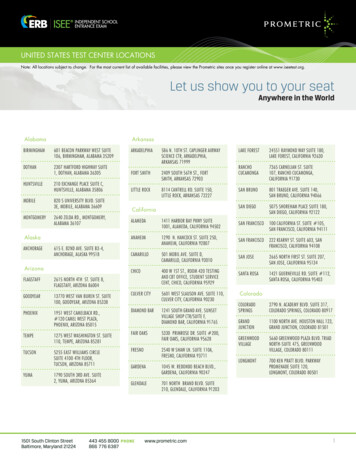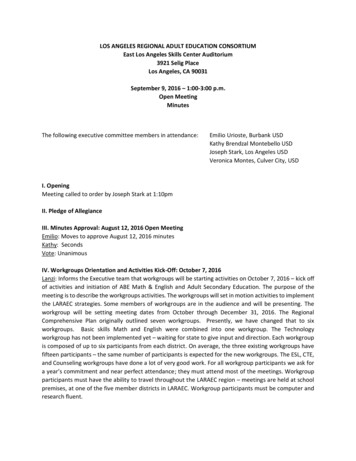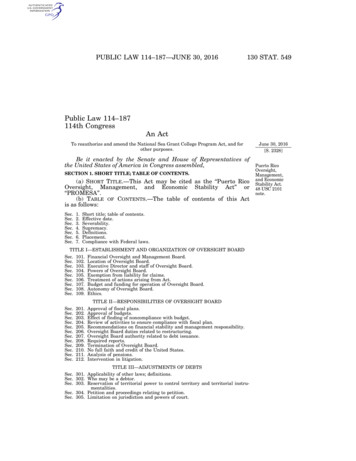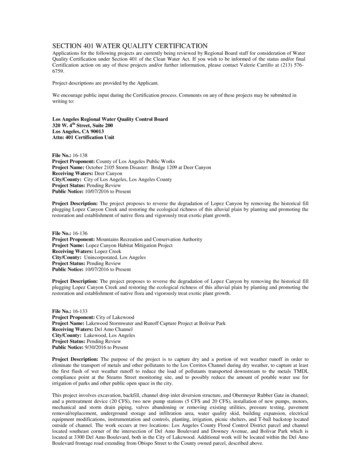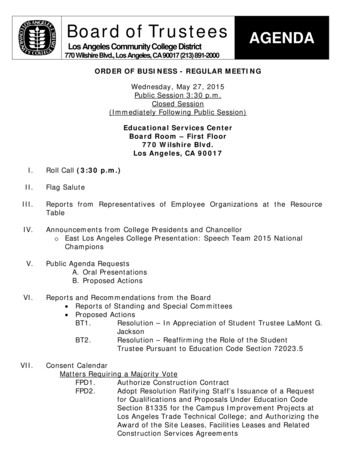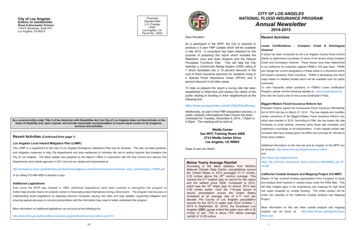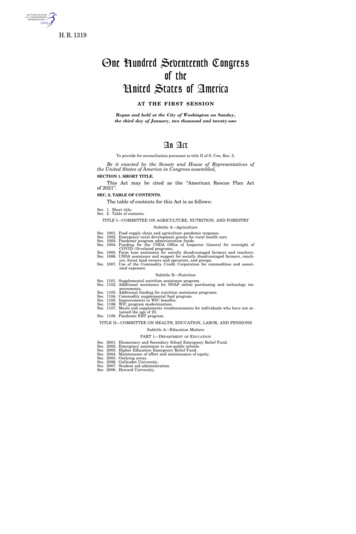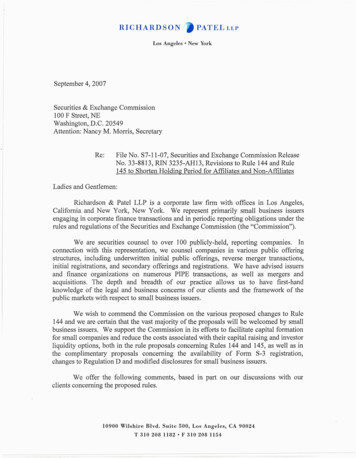
Transcription
PATEL L L PRICHARDSulvLos AngelesNew YorkSeptember 4,2007Securities & Exchange Commission100 F Street, NEWashington, D.C. 20549Attention: Nancy M. Morris, SecretaryRe:File No. S7-11-07, Securities and Exchange Commission ReleaseNo. 33-8813, lUN 3235-AH13, Revisions to Rule 144 and Rule145 to Shorten Holding Period for Affiliates and Non-AffiliatesLadies and Gentlemen:Richardson & Pate1 LLP is a corporate law firm with offices in Los Angeles,California and New York, New York. We represent primarily small business issuersengaging in corporate finance transactions and in periodic reporting obligations under therules and regulations of the Securities and Exchange Commission (the "Commission").We are securities counsel to over 100 publicly-held, reporting companies. Inconnection with this representation, we counsel companies in various public offeringstructures, including underwritten initial public offerings, reverse merger transactions,initial registrations, and secondary offerings and registrations. We have advised issuersand finance organizations on numerous PIPE transactions, as well as mergers andacquisitions. The depth and breadth of our practice allows us to have first-handknowledge of the legal and business concerns of our clients and the framework of thepublic markets with respect to small business issuers.We wish to commend the Commission on the various proposed changes to Rule144 and we are certain that the vast majority of the proposals will be welcomed by smallbusiness issuers. We support the Commission in its efforts to facilitate capital formationfor small companies and reduce the costs associated with their capital raising and investorliquidity options, both in the rule proposals concerning Rules 144 and 145, as well as inthe complimentary proposals concerning the availability of Form S-3 registration,changes to Regulation D and modified disclosures for small business issuers.We offer the following comments, based in part on our discussions with ourclients concerning the proposed rules.10900 Wilshire Blvd. Suite 500, Los Angeles, CA 90024T 310 208 1182F 310 208 1154
Securities & Exchange CommissionPage 2 of 61.Shortening: of Rule 144 Holding Periods and StreamlinedCompliance; Codification of Staff Position on Cashless Warrant Exercises; andDistinctions between Cashless and "For Cash" Warrant Exercises.Shortening of Rule 144 Holding Periods and Streamlined ComplianceUnder the proposed amendments, the holding period under Rule 144 for"restricted securities" of issuers subject to the reporting requirements of the SecuritiesExchange Act of 1934 (the "Exchange Act") would be shortened to six months for bothaffiliates and non-affiliates. This proposed holding period, however, would be subject toa tolling provision that would extend the holding period for up to an additional sixmonths by the amount of time a holder of such securities was engaged in a hedgingtransaction. We address our views on the tolling provision, separately, below.We believe the shortened holding periods facilitate the Commission's primarypurpose in the proposed amendments, which is to increase capital formation and reducethe costs of capital to issuers. Reducing the holding periods achieves greater liquidityand makes capital investment more attractive without sacrificing the safeguards providedin Rule 144. We submit that shortening the holding periods goes hand-in-hand with otheraspects of the proposed amendments which seek to streamline the compliance aspects ofRule 144, including elimination of the manner of sale requirements in severalcircumstances and modification of the volume limitations. All of the foregoing elementsare consistent with the goals of providing greater issuer capital opportunity and investorliquidity, both of which are necessary to grow the investment environment for smallbusiness issuers.Codification of Staff Position on Cashless Warrant ExercisesWe also applaud the Commission for its efforts to clarify "staff positions" bycodifying such positions into proposed regulations. We address here the staff positionconcerning the "tacking" of holding periods for so called "cashless" exercises of warrantsand options. The Commission has proposed codifying the position that, upon a cashlessexercise of warrants or options, the newly acquired underlying securities will be deemedto have been acquired when the corresponding warrants or options were acquired, even ifthe warrants or options did not originally provide for a cashless exercise by their terms.However, if the terms of the warrants or options are amended to permit cashless exercise,and in connection with such amendment, the holder provides consideration other thansecurities of the issuer, then the securities received on the cashless exercise of suchwarrants or options will be deemed to have been acquired on the date the warrants oroptions were amended.Dktinctions between Cashless and "For Cash" Warrant ExercisesWhile we agree and support the Commission's determination to codify the staffposition on "purely cashless" warrant and option exercises, we note that the Commissioncontinues to draw a distinction in tacking treatment in the context of an exchange of
Securities & Exchange CommissionPage 3 of 6securities and tacking in the context of a "for cash" or "mixed" cash and securitieswarrant or option exercises. This distinction is drawn out in the Commission's expressdenial of tacking where consideration other than securities is provided to amend the termsof a for-cash warrant or option to convert such securities to a cashless warrant or option.We believe that eliminating the distinction on tacking treatments between "forcash" and "cashless" exercises is critical to the Commission's stated purpose in theproposed amendments - which is to facilitate capital raising and reduce the costs ofcapital. Moreover, we find the distinction harmful to the facilitation of such activitiesbecause it deprives issuers of a ready source of cash (in the form of exercises for cash)since the Commission's rules would continue to chill cash exercises unless such sharesare then registered - adding cost and expense to obtain the capital infusion. Denying thetacking of holding periods for cash warrant exercises is a strong disincentive to investorsto exercise warrants for cash.One of the fundamental elements of Rule 144 is the determination of wheninvestors have assumed the economic risks of investment and in turn, whether a sufficientperiod of time has elapsed between that date and the date of sale in order to ensure suchpersons are not acting as underwriters. Purchasers who purchase with a view towardsdistribution cannot avail themselves of the safe harbor of the Rule. Investors who havepurchased stock and warrants (or units of securities) have not purchased in a transactionwith a view toward distribution. In that scenario, investors have purchased restrictedsecurities with limited liquidity.Consistent with the Commission's overall purpose in these amendments, wepropose that the securities obtained upon the cash exercise of warrants, which wereacquired in private placements of restricted securities, be accorded the same tackingtreatment as securities issued in cashless exercises. In both cases, regardless of themethod of "payment" upon exercise, the investor assumed the risk of the entireinvestment at the time of the private placement and cannot be deemed to be exercising oracquiring shares with a view to distribution if a reasonable period of time has transpiredbetween the date of acquisition of the warrant (or option) and the date of exercise. Wenote there is a sharp difference between employee options (which are not acquired forcash or with any investment risk) and warrants acquired in a private placement where thewarrant terms are heavily negotiated and considered an important part of the investors'purchase decision. In essence, unlike employee options, warrants purchased in a privateplacement are a part of the investor's investment decision and risk, which is assumed atthe time the private placement closes.We would request that the Commission eliminate the unfounded distinctionbetween "for cash" and "cashless" warrant exercises and afford tacking on cash exerciseswhere the warrant or option has been held for a six month period, consistent with thetreatment of cashless exercises and the new holding periods proposed under theamendments. We believe such parameters would afford increased market efficiency,increased available cash to issuers, reduced liquidity costs and overall further theCommission's purposes in easing capital formation for small business issuers.
Securities & Exchange CommissionPage 4 of 6Finally, we note that the Commission (and the staff) has provided no support forthe unstated position that holders who exercise for cash do so with a view towarddistribution, whereas holders who exercise on a cashless basis do not. The Commissionhas provided little guidance as to why it continues to distinguish between cashless andfor-cash exercises in the matter of tacking and analysis of investment risk. Admittedly,the Commission is following the plain text of Rule 144(d)(3)(ii). However, given theCommission's interest in promoting capital formation and capital raising efficiencies, itseems logical to extend the staffs tacking position on cashless warrant exercises to forcash warrant exercises. In both circumstances, valuable consideration is being given forthe exercise, and we see no logical reason to conclude that investors who "pay" for theexercise in securities are less likely to do so with a view toward distribution or that theyhave not renewed their investment risk at the point of exercise.Accordingly, we propose that the Commission amend the new rule proposals toeliminate the distinction between tacking treatment in the cases of cashless and for-cashwarrant exercises and afford securities issued upon the cash exercise of warrants oroptions the same tacking provisions as securities issued upon a cashless exercise ofwarrants or options.2.Tolling of the Holding Period in Connection with Hedging;Transactions; Request for Further Clarification on Shareholder and BrokerRepresentations on Hedging Transactions.Tolling of the Holding Period in Connection with Hedging TransactionsThe Commission has proposed a tolling provision whereby the minimum holdingperiod (six months in the case of the proposed amendments) applicable to restrictedsecurities of a reporting company under the Exchange Act would be tolled while theholder of the securities (or the previous owner of the securities) is engaged in certainhedging transactions, e.g., equity swaps, short sales and other such transactions,involving the securities. The proposed tolling provision would not apply if the holderholds the securities for a period of at least one year, regardless of any hedging activity bythe holder (or the previous owner of the securities) during such one-year period. Thistolling period contradicts the Commission's purpose in facilitating liquidity by making itmore difficult (not easier) to sell restricted securities.In the release, the Commission has expressed a concern that hedging transactionsshift the economic risk of the investment away from the security holder with respect torestricted securities under Rule 144, making it more difficult to determine if the holderhas held the security for investment purposes and not with a view toward distribution.The Commission has stated that the concern regarding hedging is particularly acute if theholding periods are shortened to six months, as proposed. Further, the Commissionbelieves that the shortened holding period would itself make hedging more economicallyattractive and prevalent.
Securities & Exchange CommissionPage 5 of 6We respectfully disagree that hedging transactions transfer economic risk entirelyor that hedging harms issuers' ability to raise new capital. We note that hedgingtransactions are completely separate transactions undertaken by a holder and a thirdparty. They entail costs and risks for the holder. The structure and economics of varioushedging transactions are irrelevant to the question of whether the investor assumed a riskof investment in the issuer's securities at the time the private placement closed, orwhether, by virtue of engaging in hedging transactions, the investor has purchased with aview toward distribution or otherwise intends to act as an underwriter. These are thefundamental inquiries of Rule 144 (as discussed above) and the legal analysis is nodifferent with respect to investors engaged in hedging transactions.In essence, the perceived mitigation of risk by hedging is just that - perceivedreduction of risk. There is in fact little reduction of risk since the restricted securities arealready purchased and paid for by the investor. Regardless of whether such after markettransactions are an economic success to the investor, the investor continues to bear therisk of the original purchase of the securities, as well as any additional risks or costsassociated with the hedging transaction. The hedging transactions have no direct bearingon issuers' abilities to raise new capital. However, in light of the Commission'sproposals, if investors are "penalized" on the holding periods for engaging in hedgingtransactions, then issuers may in fact lose such persons as potential investors - whichcontradict the overall intent of the proposals. At best, we propose that any tollingprovisions enacted by the Commission be limited to securities that are the subject ofhedging and not the entire holdings of a hedging investor.Request for Further Clarification on Shareholder and Broker Representationson Hedging TransactionsIn connection with the proposed tolling provision, the Commission is proposingadditional changes to Rule 144 to provide that Form 144 filings include informationregarding any short position or put equivalent position held with respect to the restrictedsecurities prior to their resale, and add the requirement that brokers inquire into theexistence and character of any short position or put equivalent position entered into withregard to securities with a holding period of less than one year.As attorneys who frequently counsel issuers and investors on matters of holding,selling and tacking of restricted securities, and who are often required to issue legalopinions concerning the sale of restricted securities, we ask that the Commission providefurther clarification and guidance as to the required Form 144 disclosures and brokerinquiries. Since we must rely upon the disclosures made by shareholders and brokers inrendering advice and issuing opinions, we ask that such disclosures be as detailed aspossible, and that substantiation of the disclosures be provided, if needed. While weunderstand that questions of reliance on third party representations are a matter of legalopinion practice and that applicable bar associations will need to further address thesematters, we request that the Commission clearly delineate the type of information whichsellers must disclose on a Form 144, the depth or process of inquiry brokers mustundertake, and the substance of the disclosures and conclusions that must be made by
Securities & Exchange CommissionPage 6 of 6both sellers and brokers before restricted securities that have been the subject of hedgingtransactions can be sold under Rule 144.In addition, we ask that the same types of clarification be made as to whetheraffiliates of a hedging seller are similarly restricted by the tolling provisions and subjectto the same Form 144 disclosures. We make the same request with regard to the"aggregation" analysis of multiple, affiliated sellers.We submit that there is much needed additional clarification and guidance to beprovided by the Commission on the compliance mechanics of the tolling provisions andsale of the hedged securities. Absent such clarification and guidance, we anticipate that"pockets" of securities practice - in terms of what disclosures and broker inquiries andrepresentations are adequate - will develop, creating inconsistency and lack of reliabilityand efficiency in selling restricted securities that are subject to hedging transactions.Ultimately, that lack of efficiency in the sale process will hamper, not facilitate, investorinterest in small business issuers by muddying the waters on sales of restricted securitiesheld (or to be acquired) by investors who are likely to enter into hedging transactions.This complication is wholly inconsistent with the Commission's purpose in theamendments to promote capital raising, to lower costs and to create greater capitalformation efficiencies in the public markets.Thank you for your consideration of our comments in this matter.Respectfully submittedRICHARDSON & PATEL LLPIS/ Nimish Patel, Esq.IS/ Jennifer Post, Esq.IS/ Ayla Nazil, Esq.
The Commission has proposed codifying the position that, upon a cashless exercise of warrants or options, the newly acquired underlying securities will be deemed to have been acquired when the corresponding warrants or options were acquired, even if the warrants or options did not originally provide for a cashless exercise by their terms.
